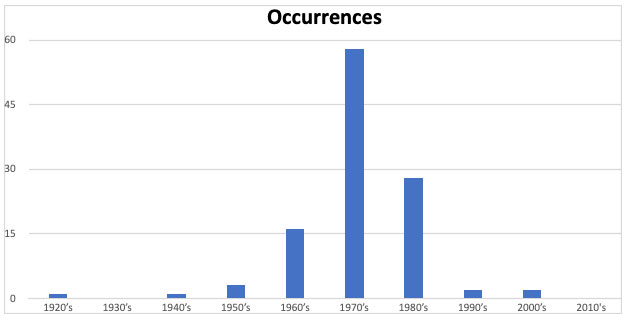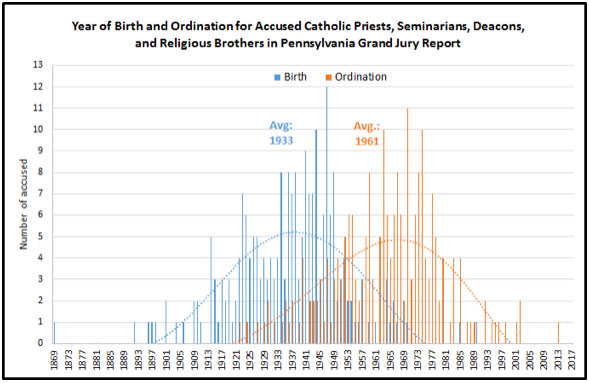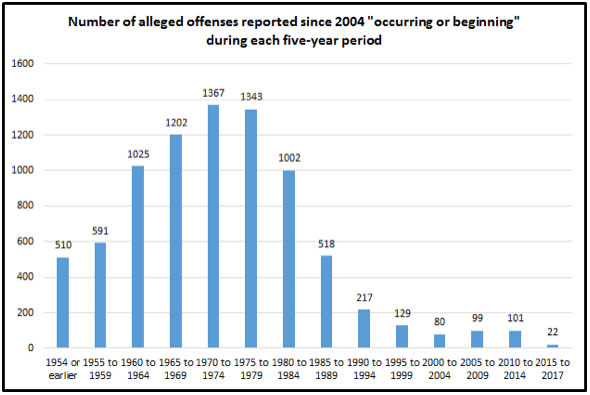Dear Brothers and Sisters in Christ,
The sexual abuse of minors by clergy has brought shame to our Church and has caused enduring harm to victims, many of whom have suffered in darkness and secrecy. Unfortunately, our own diocese has not been immune from this suffering. This Promise site is part of our efforts to bring transparency and clarity to this issue, specifically in the Diocese of Springfield in Illinois.
Despite the deep tragedy represented in this site, the facts included here show that, consistent with the most comprehensive nationwide research, instances of sexual abuse of minors in the Church rose dramatically in the 1960’s through the 1980’s, then rapidly declined in the 1990’s through current time. The decline in abuse clearly corresponds to the rise in awareness of the gravity and breadth of this issue and the United States Conference of Catholic Bishops’ implementation of more consistent and strict policies for handling abuse allegations in 2002 (known as the “Dallas Charter”). While it cannot be said with certainty that the Dallas Charter caused the decline, it is one among several changes that have increased awareness of this issue and helped proactively to prevent abuse.
During my time here as your bishop, we have had one allegation of sexual abuse of a minor by a priest who was still in ministry. This case, which involved abuse alleged to have occurred in the 1980s, was referred to civil authorities and to our diocesan review board, consistent with the Dallas Charter protocols. That allegation was deemed credible, and the priest was permanently removed as pastor. His faculties for priestly ministry were revoked and he will not be given any future ministerial assignment.
As your bishop, I promise you my sustained vigilance and diligence in handling these issues. In this site, you will find information about our Safe Environment program and related efforts to ensure we never again allow this scourge to harm our people and our Church.
May God give us this grace.
Sincerely yours in Christ,
![]()
Most Reverend Thomas John Paprocki
Bishop of Springfield in Illinois
Our Track Record Here in the Diocese of Springfield in Illinois
Since 2002, our diocese has promoted an environment of awareness and safety that is certainly on par with leading organizations throughout the country, and in some ways more advanced than many, at least in its maturity. Our Diocesan Review Board and Special Panel have been in place and effective for more than 15 years, and our safe environment awareness and prevention efforts have been widely implemented and successful.
Below are some key statistics highlighting the breadth of our preventative safe environment program:
Historical Perspective
Unfortunately, the implementation of our safe environment, beginning in the early 2000’s, was prompted by very public and scandalous revelations of sins in our own clergy, including one of our own bishops. While shocking and painful for the faithful, priests, deacons and religious of this diocese, these circumstances also created an environment of awareness, and prompted a series of actions, in our diocese that many others are just now coming to terms with.
The result of all this is what can only be honestly described as a mixed track record in our diocese, marked by grave sin but also by diligent and effective response, with a clear turning point near the close of the last century, as illustrated in the graphic below.
As this graphic illustrates, there was an increase in cases of abuse during the 1960s, reaching a peak in the 1970s, declining but persisting during the 1980’s and returning to very low levels for the past two decades. As noted in “The Big Picture” section here, a highly similar pattern has played out nationally. None the less, this diocese remains committed to an environment of vigilance and proactive defense against any recurrence of abuse.

Disclosure of Specific Cases
With the intent to shine a light on any past troubles remaining hidden in shadow, and to reinforce our efforts of vigilance and diligent handling of abuse, below is a summary of all substantiated cases of sexual abuse of a minor by clergy in this diocese as disclosed in our voluntary review with the Illinois Attorney General’s office.
Deceased
| Name/ | Date of Ordination | Status Date |
|---|---|---|
| Alvin Campbell | 5/31/1952 | 12/2/2002 |
| Eugene Costa | 7/24/1976 | 10/12/2007 |
| Robert Dodd | 5/30/1964 | 3/28/2013 |
| Michael Driscoll | 3/30/1941 | 5/15/1989 |
| Robert Eagear | 6/2/1928 | 9/22/1984 |
| George Faller | 6/13/1918 | 10/23/1975 |
| Ray Franzen | 5/18/1940 | 10/4/1987 |
| Joseph Havey | 5/29/1971 | 8/21/2017 |
| George Kromenaker | 6/8/1947 | 5/10/2010 |
| Joseph Cullen O'Brien | 4/5/1942 | 3/27/1978 |
| Frank O'Hara | 3/30/1941 | 4/19/2006 |
| James Patrick O'Hara | 4/8/1945 | 11/15/1987 |
| Daniel Ryan | 5/3/1956 | 12/31/2015 |
| Aloysius Schwellenbach | 3/28/1948 | 9/15/2000 |
| Louis C. Shea | 6/4/1955 | 11/15/1996 |
| Frank Westhoff | 5/27/1961 | 1/7/2006 |
Laicized
| Name | Date of Ordination | Status Date |
|---|---|---|
| Joseph Cernich | 5/2/1983 | 6/2/2003 |
| Walter Weerts | 12/18/1960 | 1/13/1989 |
Not in Active Ministry
| Name | Date of Ordination | Status Date |
|---|---|---|
| Garrett Neal Dee | 5/23/1964 | 7/31/2002 |
| Robert DeGrand | 5/31/1980 | 5/1/2015 |
| Francis Tebangura | 12/9/1968 | 3/10/2006 |
Religious and Extern Priests
who served in the Diocese
These are religious or extern priests who served in a parochial ministry in the Diocese of Springfield in Illinois for a time, and whose own religious order or home diocese subsequently substantiated an allegation of sexual abuse of a minor made against them. The alleged conduct occurred outside the Diocese of Springfield in Illinois.
- Frank Martinez Jr. - Diocese of Davenport, Iowa
- J. Gerard Griffin - Diocese of Trenton, New Jersey
(Last updated September 23, 2022 - Frank Martinez Jr. and J. Gerard Griffin)
The Big Picture
While we are clearly focused on creating a culture and environment in this diocese that rejects sin and deals forcefully with issues of misconduct and abuse, it is also important to step back and observe the broader context of some national trends that have clearly affected us locally.
As depicted below, in data assembled from the Pennsylvania Grand Jury Report, there was a clear historical spike in instances of abuse, with a peak in the 1970’s and a steady decline that persists into current times. There is also a clear profile of priests predominantly born in the 1930’s and ordained in the early 1960’s. This data is also consistent with broader data reported in the 2004 John Jay study. While by no means a signal that we should reduce our vigilance, there is a clear and indisputable fact that much of what we continue to see being revealed is related to a troubled time period that is now historical.

To further broaden this perspective, the graph below presents data aggregated by the Center for Applied Research in the Apostolate (CARA) representing the number of alleged cases of clergy sex abuse of minors during each five-year period from 1950 up through 2017. This data is for the entire U.S. Church, and it is for allegations that have been reported since 2004. (Note: The reported date and the alleged incident date are often decades apart). As the graph shows, new abuse allegations have not disappeared altogether — there were 22 that were reported to have occurred during this most recent five-year period we’re in — though they have dropped significantly. This is still far too many — zero should be the only acceptable figure. However, to give these numbers some context, consider that 42 teachers in the state of Pennsylvania lost their licenses due to sexual misconduct in 2017 alone. This is no excuse for what has happened in the Church; rather, these statistics put into proper context all the diligent work the Catholic Church has done and continues to do at preventing sexual abuse in its institutions and shows that it is committed to purging this evil from its ranks.

The Bigger Problem of Child Sexual Abuse Outside the Church
While the Catholic Church, thankfully, has seen a near-elimination of clerical sex abuse of minors over the past two decades, there is a far broader and more alarming issue about child sexual abuse in our society. Unfortunately, a disproportionate focus on the Church’s historical failings has come at the expense of public awareness of the broader issue.
Consider these facts:
- According to a study by a professor at Hofstra University, there is 100 times more child sexual abuse in public schools than in the Catholic Church1
- 16% of U.S. youth ages 14-17 are sexually abused in any given year2
- That means more than 3 million children suffer from sexual abuse each year3
- The Illinois Department of Children and Family Services found credible evidence that child sexual abuse occurred in the general population in Illinois in over 2,000 cases per year from 2009 to 20164
- Insurance companies receive more than 200 reports per year of sexual abuse of minors in U.S. Protestant churches—which, each year, is more than the total allegations against the Catholic Church in the U.S. since 20055
- In Pennsylvania, there were 3 times more cases of child sexual abuse identified statewide in 2016 than there were in the entire 80-year time period covered in the Grand Jury report.
To be clear, the intent in sharing this information is not to deflect responsibility for the troubled history and past sins of the church. Our church has certainly owned up to those issues, and, as described here, we have aggressively addressed this issue and reduced to zero the number of new alleged incidents of clergy sex abuse in our diocese since 2004. However, the rest of our culture and public institutions have not done likewise, and our children are in grave danger as a result. There is much the Church has learned and can offer to our other institutions in confronting this problem. Meanwhile, our public resources would be better spent to implement programs like our Protecting God’s Children program, rather than in continuing to fund investigations into well- documented historical failings of the Church from decades ago.
- https://www.edweek.org/ew/articles/2004/03/10/26abuse.h23.html
- ibid
- https://datacenter.kidscount.org/data/tables/101-child-population-by-age-group#detailed/1/any/false/871,870,573,869,36,868,867,133,38,35/62,63,64,6,4693/419,420
- https://www2.illinois.gov/dcfs/aboutus/newsandreports/Documents/CANStat.pdf
- https://www.nytimes.com/2007/06/16/us/16protestant.html
Resources
Clerical Sexual Abuse of Minors: Policy for Education, Prevention, Assistance, and Determination of Fitness for Ministry
Safe Environment Training
Our diocese offers a comprehensive and effective safe environment training and awareness program, staffed by a full-time leader at the Catholic Pastoral Center and by hundreds of local facilitators and coordinators.
For questions about our safe environment training or any upcoming sessions, to identify your local facilitator or coordinator, or to get involved as a facilitator or coordinator, please contact Alison Smith, Director, Office for Safe Environment, 217-698-8500, or email: asmith@dio.org.
Diocesan Review Board
This Diocesan Review Board is led by predominantly lay people and is responsible for intake and review of claims of abuse of minors by clergy or other church personnel.
Special Panel for Clergy Misconduct
Allegations of financial misconduct or sexual misconduct with adults are handled by a separate group called the Special Panel on Clergy Misconduct, led by lay people and which is headed by William Roberts, formerly the U. S. Attorney for the Central District of Illinois.
How to Report Concerns
To report allegations of sexual abuse of a minor by clergy or other church personnel -- even if it is in the past -- individuals are encouraged to call the Diocese's Child Abuse Reporting and Investigation number at 217.321.1155. Individuals may also contact Illinois Department of Children and Family Services Child Abuse Hotline at 1.800.25.ABUSE.
To report financial misconduct or adult sexual misconduct committed by a priest, deacon, or lay employee of our diocese, call 1-866-346-2003 or email . These hotline calls and emails go directly to the office of Mr. William Roberts.
We welcome any insights, suggestions, or concerns you may have that will help advance our efforts. If you have specific concerns regarding possible misconduct or abuse, we ask that you contact the appropriate resource outlined here.
